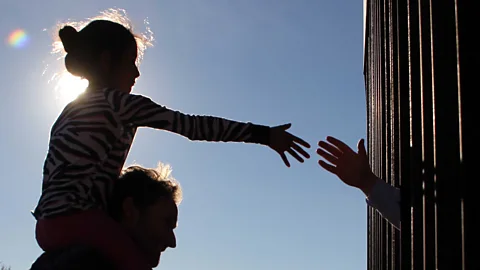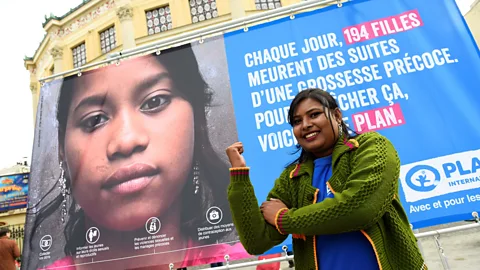The surprising downsides of empathy
 Getty Images
Getty ImagesThere’s a dark side to feeling the emotions of other people. In some cases, it can even lead to cruelty, aggression, and distress.
On CBeebies, the BBC service for little children, there’s a programme called Treasure Champs, which aims to teach young viewers about their feelings, and how to manage them. In one episode, the character Barry – a blue rectangle with pink eyebrows – is glum about the result of his football match.
“We lost,” says Barry.
“It doesn’t matter!” says Kari.
“It was my fault. I let all the goals in.”
“I don’t understand why you’re so sad. Just forget about it.”
“I can’t.”
“Why not? It’s just a game.”
“You’re not showing a lot of empathy, Kari. It means putting yourself in someone else’s shoes.”
“Your shoes won’t fit me, Barry.”
As definitions go, Barry’s one seems a pretty good one for empathy – it’s about projecting yourself into somebody’s mind to feel what they feel. And as the episode goes on to tell its young audience, understanding other people’s feelings is important.
In the adult world, however, the virtues of empathy are less clear. As the pandemic pushes us into isolation, culture wars rage, and disinhibited cruelty brews on social media, it feels a little controversial to suggest that empathy has downsides. Yet in recent years, researchers have found that misplaced empathy can be bad for you and others, leading to exhaustion and apathy, and preventing you from helping the very people you need to. Worse, people’s empathetic tendencies can even be harnessed to manipulate them into aggression and cruelty. So, if not empathy, what should we aim to feel instead?
You may also like:
The word empathy comes from the German word “Einfühlung”, coined in the late 1800s, which might broadly translate as “feeling into”. But as psychologist Judith Hall of Northeastern University wrote in Scientific American last month, “empathy is a fundamentally squishy term”. Some see it as the ability to read their fellow human beings, or simply feeling connected to people, while others see it as more of a moral stance about showing concern for others. Even researchers disagree when they are studying it.
Still, “despite the conceptual squishiness, most people view empathy as having something to do with understanding what other people are going through and being concerned about them”, writes Hall.
 Getty Images
Getty ImagesPaul Bloom, a psychologist at Yale University, defines empathy specifically as the act of stepping into someone’s mind to experience their feelings – and it’s this that he takes issue with. “Even in this narrow sense, empathy might seem like an obvious force for good. Common sense tells us that experiencing someone else’s pain will motivate us to care about and help that person,” he writes in the journal Trends in Cognitive Sciences. However, it leads to some tricky moral dilemmas.
To illustrate why, Bloom tells the story of a 10-year-old girl called Sheri Summers, who has a fatal disease. Doctors have placed Sheri on a waiting list for a treatment that will relieve her pain, and potentially prolong her life. Sadly, this very bright, very brave girl learns she has weeks or months before that happens.
Imagine how that feels, and how it will affect Sheri’s life. What would you do if you had the opportunity to bump her up to the top of the list?
When participants in a study were presented with Sheri’s (fictional) story, encouraging them to feel empathy for her, around three-quarters moved her up the list to get her treatment earlier.
Yet as Bloom points out, doing so could mean every other child above her on the list would have to wait even longer, many of whom might be more deserving.
This is an example of what psychologists call the “identifiable victim effect”. People are much more likely to open their hearts – or wallets – when there is a visible beneficiary whose pain could be alleviated. The charity that campaigns with a single story of a named, suffering child may win more donations compared with the charity that deploys statistics describing 1,000 anonymous children.
As journalist Tiffanie Wen wrote for BBC Future recently, this effect can also help explain why many people become numb to the deaths of strangers caused by the coronavirus – which passed one million this week – yet be in up in arms about the minor loss of personal freedoms they more directly experience. For most of us, the worst suffering of the pandemic goes unwitnessed.
 Getty Images
Getty ImagesThere’s nothing wrong with using personal stories to raise awareness of a worthy cause, of course, but the identifiable victim effect does nonetheless siphon billions of dollars away from where it could do more good for a greater number of people. If your goal was to help as many children as possible, a dollar spent on deworming programmes in the developing world, for instance, would go significantly further than a dollar donated in the US for an expensive medical procedure. It can be even harder to attract attention to problems that have no identifiable victim at all, such as future generations affected by climate change, who do not exist yet.
Extending empathy to abstract strangers is a particular challenge for the human mind. Originally described by the Stoics thousands of years ago, the concept of “oikeiōsis” describes how our empathy and affinity for others declines by proximity to our lives. Imagine a series of rings: in the bullseye there’s the self, the innermost ring represents one’s family, the next ring one’s friends, the next one’s neighbours, then one’s tribe or community, then one’s country, and so on.
The problem, says Bloom, comes when bad actors hijack these “circles of sympathy” to try and sway our behaviours and beliefs. Our natural empathy for those closer and more similar to us can be harnessed to provoke antipathy towards those who are not.
In one study, undergraduates were told about a fellow student in the next room, who was in the running for a cash prize in a mathematics contest against another competitor. The undergraduates were given the opportunity to force that competitor to eat distracting hot sauce before the contest. When empathy for the student was ratcheted up, by emphasising she was struggling financially, people were more likely to give a greater dose of hot sauce to her innocent opponent.
Politicians and activists on both sides of the spectrum often play to the idea of “us and them”, deploying empathy and identifiable victims to make a political case. It underpins some social media campaigns to “cancel” people, allows immigrants to be demonised, and can even stoke hatred and violence against apparent outsiders. Lynchings in the US were sometimes motivated by stories of victims affected by the crimes of black men, writes Bloom. And as I wrote a few weeks ago, leaders have also manipulated people’s natural empathic tendencies to help justify nuclear strikes, arguing that the lives of a million US soldiers – “our boys” – would be saved by launching atomic bombs against the Japanese people in a distant land.
 Getty Images
Getty ImagesA final downside of empathy is its sometimes-incapacitating emotional impact. The philosopher Susanne Langer once called empathy an “involuntary breach of individual separateness” – and this seems to apply particularly when we observe someone suffering, such as a loved one. Brain scan studies by neuroscientist Tania Singer of the Max Planck Society in Germany have shown that when people watched others in pain, their brain activity in the regions associated with pain was partially mirrored. This may be an evolutionary adaptation to help us predict, and avoid, how pain would affect us.
“While shared happiness certainly is a very pleasant state, the sharing of suffering can at times be difficult,” writes Singer and her colleague Olga Klimecki, a neuroscientist at the University of Geneva. At its worst, people feel “empathic distress”, which can become a barrier to action. Such distress leads to apathy, withdrawal and feelings of helplessness, and can even be bad for your health, according to Singer and Klimecki. During the pandemic, this sense of empathy fatigue has become of particular concern among care-givers, such as those working in mental health support or hospital doctors and nurses.
So, where does that leave us? Surely feeling no empathy at all is worse? That would make us closer to psychopathic. These scientists are not suggesting that empathy should be actively discouraged. There are times when stepping into somebody’s shoes is a necessary first step towards positive action, care and help for others.
Instead, the research suggests that we ought to start making a clearer distinction between empathy and its apparent synonym: “compassion”. If empathy is about stepping into someone’s shoes, compassion is instead “a feeling of concern for another person’s suffering which is accompanied by the motivation to help”, according to Singer and Klimecki. To be compassionate, it does not mean you have to share somebody’s feelings. It is more about the idea of extending kindness towards others.
Bloom uses the example of an adult comforting a child who is terrified of a small, barking dog. The adult doesn’t need to feel the child’s fear to help. “There can be compassion for the child, a desire to make his or her distress go away, without any shared experience or empathic distress,” he writes.
Inspired by scanning the brains of Buddhist monks, Singer discovered that it’s possible to foster greater compassion in people, via simple training methods based on mindfulness, where the goal is to feel positive and warm thoughts about others without focusing on vicarious experience. By comparing this training with techniques designed to foster greater empathy, she and colleagues found that it reduces the effects of empathic distress and makes people more likely to be motivated to help others.
So, to return to the hurt feelings of Barry that we started with: it’s not necessary for his friend Kari to empathetically feel his pain about his football match – and it may even be bad for her. But a dose of compassion? Even for cartoon rectangles, that would go a long way.
* Richard Fisher is a senior journalist for BBC Future. Twitter: @rifish
--
If you liked this story, sign up for the weekly bbc.com features newsletter, called “The Essential List”. A handpicked selection of stories from BBC Future, Culture, Worklife, and Travel, delivered to your inbox every Friday.
